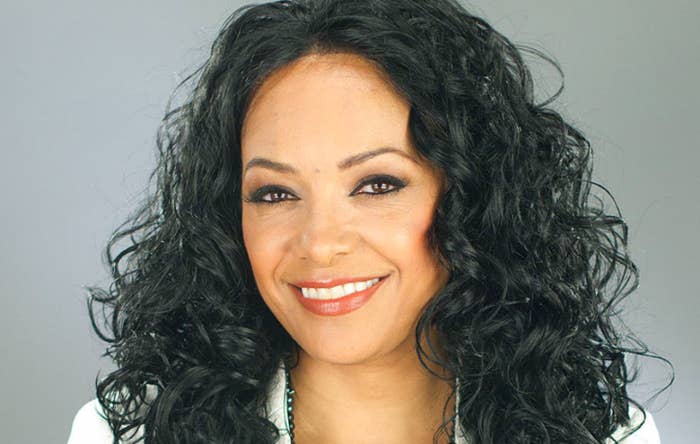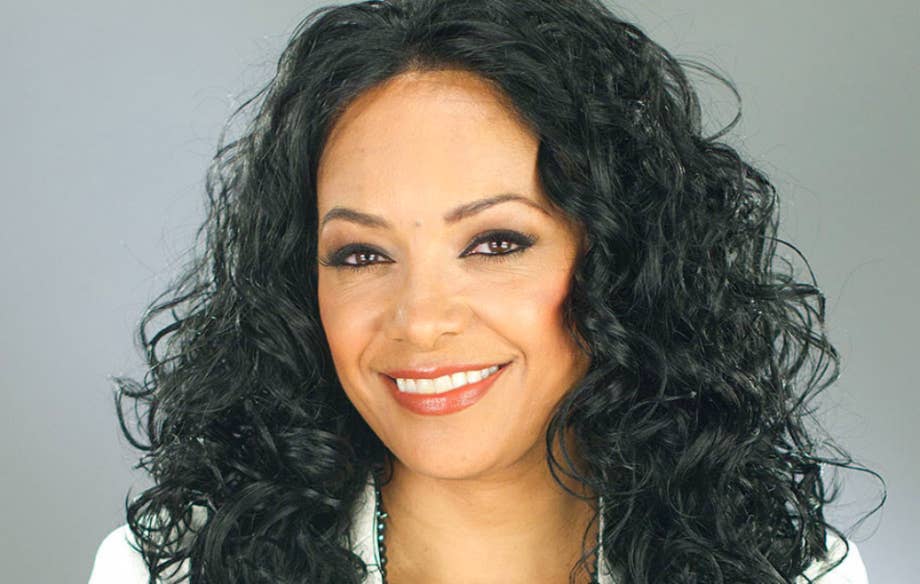
Deceivingly sunny skies, cold winds, and the rise of "Man's Not Hot" from viral clip to potential festive number one; to some, this may allude to Christmas being close, but to Kanya King, it's a clear sign that The MOBOs are around the corner. The MBE-awarded founder calls me from her office at midday, and is applying the final touches for what will be The MOBOs' 22nd awards ceremony at the First Direct Arena in Leeds—a 13,500-capacity venue set to hold another annual celebration of black music on a mainstream level. But it hasn't always been this way.
Once upon a time, there was no office to call from and huge arenas didn't want to house a celebration of music many didn't envision a future for. Back in 1996, Kanya King wanted to address that structural deficit so she re-mortgaged her house and created The MOBO Awards, embarking on a journey that offered no guarantees, a lot of no's and a great deal of risk. Brit-pop, led by the likes of Oasis and Blur, dominated this era which, combined with incorrect but still withstanding stereotypes about genres of black music lacking commercial potential, meant the prospect of an awards show championing those sounds seemed all too bleak.
There have since been 21 consecutive MOBO award shows, selling over 150,000 tickets along the way while gracing iconic venues such as the O2 Arena and Liverpool Echo Arena. Beyond the numbers, though, The MOBOs' position as the UK's go-to awards show for black music has held firm for the past two decades. Complex caught up with founder Kanya King MBE to see how she built this hugely respected staple in British music.
How did the idea for an awards show come about?
I grew up around a lot of talented musicians, but there was no mainstream platform where genres like hip-hop, reggae, R&B and soul were being celebrated. I was working as a TV researcher for an independent production company at the time, working on live music shows, so I was putting on reggae and R&B events, and I saw that there was a glaring gap in the market for a mainstream platform to celebrate black music. My events were selling out very quickly, and these were black music events. There was an incredible amount of talent and I just couldn't understand why there wasn't anything in this country to celebrate the music I grew up on. In the end, after talking to many organisations and not feeling like anything was ever going to be done or that anyone was receptive to the idea, I did something about it.
What are some of the difficulties you faced in setting up such a ceremony, one which celebrates the music of black origin?
There were a lot of hurdles to overcome and minds to change. People felt that with black music events, there would always be trouble; that the artists wouldn't show up, that the media wouldn't get behind it, that there wasn't an audience for the music. People felt that black British music wouldn't sell, that it wasn't marketable. All of these things. I was told time and time again that I was wasting my time and energy, because people had done it before and not been a success. There was a lot of negative noise out there, but I just had to shut it out and have that single-minded focus that I would make it work.
You mentioned that others have tried to set up award shows but didn't succeed. The inaugural MOBOs was the first televised multicultural event to be broadcast nationwide—how did you manage to achieve that when the odds were seemingly against you?
There's a saying that goes "you don't know what you don't know", and the truth of the matter is, I never imagined the hurdles and obstacles—I didn't foresee them—because I had never done this before. But when you haven't got a track record, contacts or money, it is very difficult to convince people to come on board with you. There was no 'Plan B' for me. I put everything into it. I ended up re-mortgaging my house and I didn't tell my mum at the time. I couldn't find a financial backer or indeed many supporters, because it was a time where Brit-pop was at its peak. When I managed to convince the broadcaster to televise the event, they told me they had little budget and that I needed to get it done in six weeks—I didn't have a lot of time. I couldn't find sponsorship; I didn't have that track record, so I re-mortgaged the house because I wanted to put my money where my mouth was, and show that I overwhelmingly believed in this. I had to show people that I had so much faith in this working, and what I was prepared to do to make it happen.
In 2013, you were named as one of the UK's most powerful women by BBC Radio 4. What are some of the challenges that women of colour face working in the entertainment industry, and how did you overcome them?
When I started out, I remember feeling very isolated because there wasn't other people in your position that you could turn to. I'm so used to being in meetings where I am the only person of colour, or the only female, but the issue isn't just race and gender—it's also a class one. You need to have curators of culture at a senior level, so we know there's work being done at entry level, but we just need to ensure we have the diversity and inclusion at senior level too. We also created The MOBO Trust to help address some of those issues—helping creatives get into theatre, music, television—and we provided some apprenticeships in partnership with ITV last year too.
Often, people might gloss over the problem because there are many creatives from minority backgrounds at ground level, but at senior level, those groups are less seen. What advice would you give to someone who comes across those barriers that prevent them from occupying positions of power?
When you're working in an organisation and you're providing value to that organisation, they think: "Wow! I can't do without them." If you've got that positive mindset and you're consistently providing value, you do get noticed, but you just have to persevere and be resilient. Sometimes, surrounding yourself with a good network gives you the motivation you need, the advice and guidance from people who have been there and done it before. A lot of people leave because they get very frustrated, but if you have that network of support, I think that makes all the difference.
There has been a growth in UK award shows recently; GRM Daily's Rated Awards, for example, have grown considerably in the past three years. What are your thoughts on the emergence of more of these shows?
From a talent point of view, they're good opportunities because, at the end of the day, what you're trying to do is help the talent take their art to the next level. Because there's more success now, you will see more and more award shows appear, and that shows how healthy the music we have is at the moment. It's all positive.
For the past twenty years, The MOBOs have been viewed as the No. 1 ceremony for black music in the UK. How did you get things to a point where winning a MOBO is a big deal?
Through being relentless. Credibility comes from an incredible amount of hard work, passion, and belief. And it also comes from success and reputation. Over the years, I remember, we always used to get people wondering if The MOBO Awards were going to happen the following year, because we were out there on our own, punching above our weight. We basically worked extremely hard to establish a world-class brand, and credibility comes from punching above our weight, putting together a good team, and we're doing more and more things all year round. We've become an iconic, year-round, agenda-setting brand, leading up to and beyond The MOBO Awards. And a lot of people follow us, so it shows us we must be doing something right [laughs].
How has the following of The MOBOs grown compared to when you first started in 1996?
We've had to be more creative and engage on many different platforms—creating content online, and giving the audience exclusive content. Every year, The MOBO Awards receive huge levels of engagement. We've trended at number one with huge amount of engagement not just in the UK, but worldwide too for many, many hours. Something like 1 in 10 viewers were tweeting about the event, demonstrating the passion and engagement of MOBO fans. 62 million people engaged with MOBO across our social media platforms last year and there was something like seven million Snapchat views. So there were really high numbers and that shows how it's grown over the years.
How has the gradual dominance of grime and UK rap impacted things?
It's fantastic to watch and see the success and talent of people like Kano and Skepta. There's been a lot of artists who've won Best Newcomer at The MOBOs, who weren't household names when they won—but then people start talking about them regularly in the media. Krept & Konan were unsigned when they performed at our show; that whole DIY culture of working together and supporting each other, it was unusual to have unsigned artists performing on a massive platform like that. It just goes to show how the black British music scene has grown from strength to strength and it contributes hugely, both commercially and artistically, to our industry, and that is being recognised. MOBOs has become an important part of the scene; from the beginning of careers to the pinnacle of success.
What are your top three moments from in MOBO history?
Wow! I couldn't even pick three moments, because there have been so many. We had a documentary last year called Paving The Way, which is about the MOBO journey, and when you look at some of the old performances—it's just incredible. I remember, So Solid were a defining moment at the time; there were a lot of talent out there realising they could do that too. So Solid were like superstars! They looked the part; they were all in white, flying across the stage. A lot of people tell me it was a defining moment for them. When you talk to artists, they talk about seeing Krept & Konan on the stage and realising they too can do that as unsigned artists. Those are the moments where people have grown up watching The MOBO Awards and believed that it's achievable to them.
Which artists do you feel are next up in the UK?
I love where we are at the moment because there's excitement around—whether it's Steff[lon Don] or Mabel or Yungen or Ray BLK. Nadia Rose performed at our nomination launch and she was incredible! Obviously, J Hus too. There are just so many. A lot of international artists are talking about the fantastic talent we have here in this country. It's just an exciting time, because I think there are many artists who we're going to be talking about in years to come.
Aside from the annual celebration, what other things are The MOBOs involved in?
We've created a scheme to support high-potential artists, where we offer grants to support exceptional talent in the UK with their musical career ambitions. The idea is that the grants will be able to fund a broad spectrum of activities that are vital to an artists' career and creative development. Everything from vocal coaching, support for live shows and touring, video productions, studio time, PR, marketing promotion, the backing is there. The fund isn't only available to solo artists, but also to producers, groups, and songwriters who need a financial backing. Financial backing early on is critical to the long-term growth of any emerging talent, so that's why we wanted to offer extraordinarily talented artists the chance to progress at that crucial stage. For us, it's about ensuring the sustainability, because we know this music is very popular at the moment—but MOBO will be around twenty years from now still supporting, regardless of whether it's commercial or not. We've also got a Be Positive Choir, using music and our brand as a rallying call to support social issues. We put together a 60-strong choir, and the choir consists of people who have sickle-cell disease, which is prevalent among BME communities. So the idea is to encourage young people to donate blood and help save lives. The choir will also be performing at this year's show.
The MOBO Awards airs on Wednesday 29th November, 11pm, on Channel 5.

